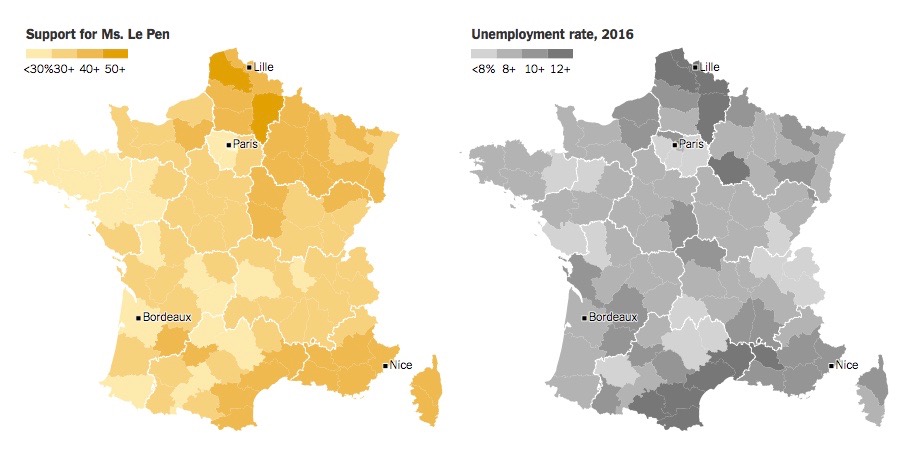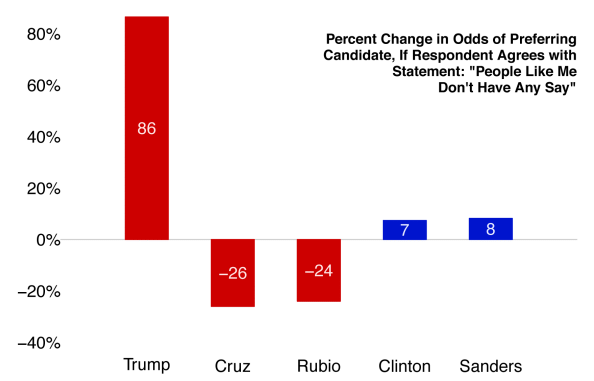— Musings —05.08.2017 08:25 AM
Le Pen, Trump, Brexit and the voiceless, rural unemployed person
The relationship is direct, and undeniable. Look at this fascinating graphic from the New York Times’ extensive coverage (and their cool interactive map here).
If you came from an area of high unemployment, you voted for the racist, anti-Semitic National Front. There was a direct correlation.
Similar analyses were done with Brexit and Trump. Check out this Brexit map via Oxford University, showing the desire to “leave” the E.U. was strongest in rural areas with low population density:
Finally, here is a fascinating and portentous early, early graphic showing the demographic that Trump always owned – the ones who feel they didn’t have anyone to speak for them (and about whom I wrote yesterday, in respect of France). These are the “voiceless” people, and they are found disproportionately among Le Pen, Trump and Brexit supporters:
“People like me don’t have any say.”
Remember Trump’s inauguration speech, the one George W. Bush called “weird shit”? Trump may have sounded unhinged, but he said the words “voice,” “forgotten,” “our people,” and “American” and “America first,” many, many times. Why? He knew who his audience was, and it wasn’t the same audience as the presidents who went before him.
To note that there is an urban/rural divide – and a chasm between the employed and the unemployed, the powerful and the powerless – is to state the blindingly obvious. It isn’t a shockingly new insight, at all. The divide always been there. But the divide – and the resentments they breed – has gotten worse.
And the political beneficiary has always been the Right. The Right have always been better at trading in resentments. They have always been better at passion instead of reason.
I wrote a book about it all, a few years back, and noted that progressives like me need to get better at the words and values stuff. My take, which is as good a place as any to end, includes a chat with a leading American political linguist, and a discussion of…Donald Trump.
So when the billionaire birther Donald Trump was musing about seeking the Republican presidential nomination, [Geoffrey] Nunberg could only shake his head in disbelief. “It’s like the asshole of the month club,” he says of the Republicans, marvelling. “And they really are assholes. They were talking about Trump. So, when he was thinking about announcing [his candidacy], he went right to the top of the Republican polls.”
“[Trump and] the Right are better at values,” says Nunberg, who is taking a break from writing his next book at his San Francisco home to talk with me. “The Right has a natural advantage in the modern context, because a lot of the issues they are promoting are emotional issues – cultural prejudices that are easier to work with, linguistically, than some of the issues that Canadian Liberals and American Democrats are concerned with.”
Words and values: I’ve been saying the same thing for years. Want to beat the likes of Trump?
Reach out to the isolated, jobless and voiceless ones. They don’t have to always agree with you. They just need to hear from you.





Great that you have caught up to Steve Bannon and Donald J. Trump (and Kouvalis), and sad that MSM and the Democrats are years (if ever) away from truly realizing all this.
Calling these fellow citizens on this earth, albeit wrong-headed, as “Deplorables”, always ranked up there with Trump’s asinine and disgusting statements.
As I stated before the election, there were two EQUALLY nasty excuses for humans vying for the most powerful position in the world.
The other realization will be that Trump is president because the Democratic Party manipulated the process so that Hillary did not get beat again for the nomination by a much better choice (first Obama, last year Bernie).
Caught up to Bannon and Trump? Seriously?
There are some things here I might not accept at face value, but I trust your greater experience and study of these things. So here’s the one thing I want to comment on.
I believe you hit here on the most important thing in politics: “Reach out to the isolated, jobless and voiceless ones. They don’t have to always agree with you. They just need to hear from you.” [I would actually disagree with the idea that they “just” need to hear from you; they need more than that; but, leaving that behind for the moment…] This is the most important thing not because it is good political strategy, but because it is the only political strategy that is both reasonable and morally sound (others may be one or the other, but not both).
And, having said this, I suspicious of three things: First, of politicians who don’t do this at all — they are, every one of them, tyrant- and dictator-wanna-be’s; second, of politicians who do this only for strategic purporses — they are, every one of them, liars and frauds; and, third, that we do not, in fact, have any politicians today who do not fit in to one of those two categories.
I missed the word “am” in the first sentence of the third paragraph (which is all one sentence, but, whatever).
I also acknowledge my closing line is too cynical. I know at least two or three politicians in Canada who I believe (based on my experience with them) are sincere in their efforts. But I still fear such are all too uncommon, and that the attitude you presecribe is not especially encouraged.
Yah, “caught up” is wrong. It should have been clarified better. Sorry.